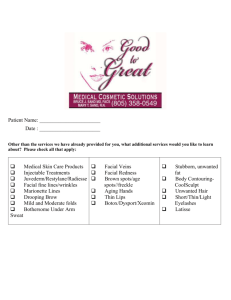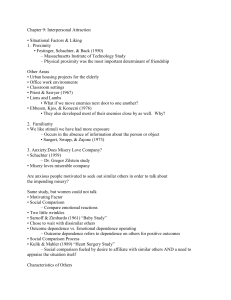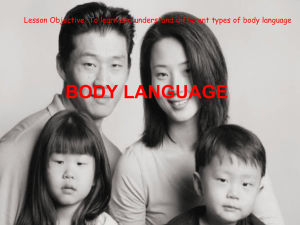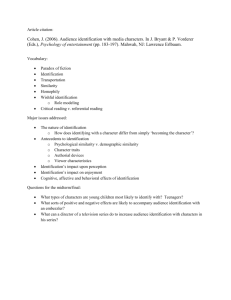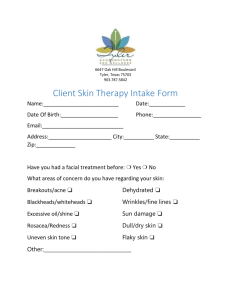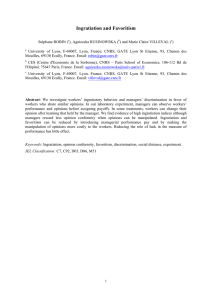Attitudes
advertisement
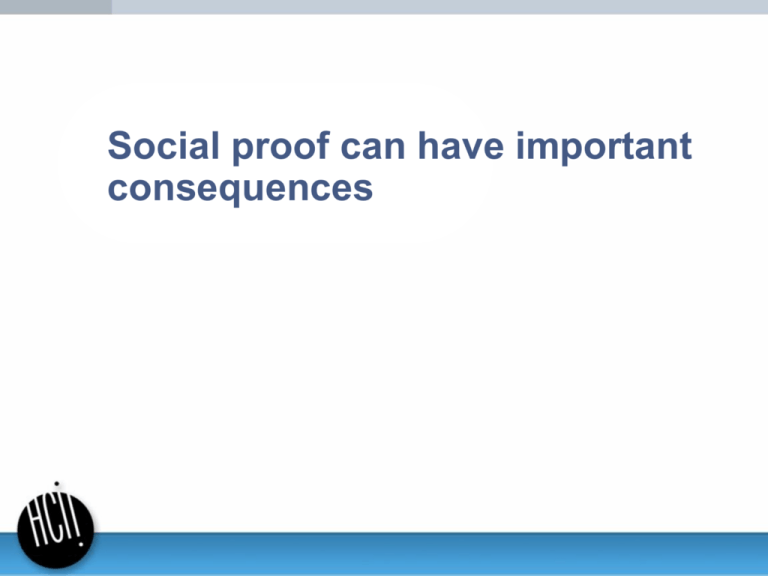
Social proof can have important consequences Orson Wells: War of the World Broadcast Mercury Theatre Radio Drama, October 30th, 1938 Text of NYTimes report 2 Kitty Genovese Case Martin Gansberg: 38 who saw murder didn’t call police (NYT article) For more than half an hour thirty-eight respectable, law-abiding citizens in Queens watched a killer stalk and stab a woman in three separate attacks in Kew Gardens. Twice, the sound of their voices and the sudden glow of their bedroom lights interrupted him and frightened him off. Each time he returned, sought her out and stabbed her again. Not one person telephoned the police during the assault; one witness called after the woman was dead. (Gansberg, 1964, p. 1) Controversy over the accuracy of the original reports Fewer than 38 eye witnesses Some did intervene (e.g., shouting, maybe calling of police) Manning, R., Levine, M., & Collins, A. (2007). The Kitty Genovese murder and the social psychology of helping: The parable of the 38 witnesses. American Psychologist, 62(6), 555. 4 Bystander Intervention Research Darley & Latané: Research program to understand Kitty Genovese murder • Naive subject alone • Naive subject with two calm confederates • Three naive subjects Cumulative proportion reporting smoke Smoke study • Subject recruited to a lab to fill out questionnaires • Smoke seeps into the study room & eventually fills it • Social condition Cumulative proportion of subjects reporting the smoke over time 100 hypothetical 3 person group 90 80 70 alone 60 50 40 30 3 person group 20 10 subject + 2 confederates 0 0 1 2 3 4 5 Minutes from start of smoke infusion 6 5 Epileptic study • Subjects go round robin, introducing themselves. The victim discusses difficulties adjusting to NYC and admits to epileptic seizures under pressure. In round two, victim becomes increasingly incoherent, spluttering that he is having a seizure and needs help • Naive subject is paired with victim only, victim + 1 stranger, victim + 4 strangers 6 Literature review • Group inhibition greatest when: • Ambiguous situation e.g., audio only • Older > younger kids • Strangers > friends Study typel Lab - 1 subject + confederates Field - real groups N studies 56 38 % % in % alone groups alone helping helping helping 75% 53% 75% 50% 22% 50% • No influence: • Bystander gender, age, ability to communicate with others [1] Latane, B. and Nida, S. Ten years of research on group size and helping. Psychological Bulletin, 89, 2 (Mar 1981), 308-324. 7 Bystander Intervention Process Social comparison processes Notice event Evaluate costs & rewards Define as emergency Accept personal responsibility for action What is the effect of others’ being present? Select mode of intervention Implement intervention • Increases likelihood of noticing the event • Depending on others' demeanor, may decrease the likelihood of interpreting event as an emergency • Informal norm of looking "cool" while assessing the situation biases others to interpret the situation as "cool" • Diffuses responsibility 8 Defense • Identify a particular helper • Be explicit about the nature of the emergency • Be explicit about what you want them to do Milgram experiment • Subjects believe they are participants in a study of effects of punishment on learning • They are asked to shock a partner (stooge) when the partner makes learning mistakes • Dependent variable is number of subjects who “go all the way”, delivering 300+ volts of electricity QuickTi me™ and a decompressor are needed to see this picture. Strapping the learning in QuickTi me™ and a decompressor are needed to see this picture. Teacher experiences shock QuickTi me™ and a decompressor are needed to see this picture. Teacher refuses Milgram video 10 Obedience to authority In Milgram shock experiments, all teacher subjects did some shocking and 65% shocked at the maximum level (450 volts), even when thinking the learner was suffering a heart attack 40% 20% 435 375 315 255 0% 195 • When victim is physically & psychologically distant from the teacher 60% 135 • When "commander" is physically & psychologically close to the teacher 80% 75 • When "commander" is an authority figure 100% 15 Effects greater 120% Percent still shocking • Experts predicted 1-2% compliance rate % of subjects shocking at various voltage levels Voltage 11 Variations Teacher's proximity to victim Tou ch Compliance decreased as closeness to victim increased Same room Voi ce fee dback Remote fm victim 0 20 40 60 80 % stopping the expe riment Teachers proximity to experimenter Compliance increased as closeness to authority increased Ta pe recorde r Te leph one conta ct Sam e roo m 0 50 10 0 % stopping the experiment 12 Latane’s Social Impact Theory • Impact of social influence attempt on an individual increases with • Number of influencers Effectiveness of Get Out the Vote Techniques Modality In person canvassing 1 new voter per 14 contacts=$18.67/new voter Personal phone calls 1 new voter per 50 contacts=$45/new voter • Up to a point • Strength • Status • Ability • Relationship to target • Immediacy • Proximity in time • Proximity in space Effectiveness Robo-phone calls Direct mail Email No discernable effect=infinite cost 1 new voter per 200 contacts=$100/new voter No discernable effect=infinite cost 13 Other examples of authority (Cialdini) • • • • • Higher manuscript acceptance rates when coming from a high-prestige university Less horn honking at luxury car vs. economy model Greater compliance to a request when requester wears a security uniform than when dressed in civvies Innovations flow through a group faster when introduced by high status member (e.g., Michael Jordan & Energy Booster bars) Deference to doctors • • 21/22 Nurses would give harmful medicine to a patient, when it is prescribed over the phone by a strange “doctor” Ear drops in R(ight) ear 15 Challenger Disaster, 1985 • Video • Jan 28, 1986, Space Shuttle Challenger takes off from Kennedy Space Center • Explodes 73 seconds after take-off • Dead: • Francis R. (Dick) Scobee, pilot Michael J. Smith; specialists Judith A. Resnik, Ronald E. McNair and Ellison S. Onizuka; payload specialist Gregory B. Jarvis, a Hughes Aircraft Corp. employee. • Managerial reconstruction at http://onlineethics.org/essays/shuttle/index.html#abstr 16 Crew • • From left to right are Ellison Onizuka, Mike Smith, Christa McAuliffe, Dick Scobee, Greg Jarvis, Ron McNair and Judy Resnick. Resnick, BS in EE, CMU 1970. 17 Background • O-rings seal sections of booster rocket • Morton Thiokol had evidence since Jan, 1985 of damage to Orings (Flight 51E) 18 Damage to O-rings & link to cold weather noted by March, 1985 • No problems at 100F, loss of seal for 2.4 sec at 75oF & for 10 sec at 50oF • 7/1/85 , M-T provides results of weather tests to NASA • 7/31/85 , M-T engineer writes memo to VP of Engineering • “Management at Thiokol and NASA shows no interest in planning a design change” 19 Memo Excerpt • "Subject: SRM O-Ring Erosion/Potential Failure Criticality. This letter is written to insure that management is fully aware of the seriousness of the current O-ring erosion problem in the SRM joints from an engineering standpoint. The mistakenly accepted position on the joint problem was to fly without fear of failure and to run a series of design evaluations which would ultimately lead to a solution or at least a significant reduction of the erosion problem. This position is now drastically changed as a result of the SRM 16A nozzle joint erosion which eroded a secondary O-ring with the primary O-ring never sealing." • "If the same scenario should occur in a field joint (and it could), then it is a jump ball as to the success or failure of the joint because the secondary O-ring cannot respond to the clevis opening rate and may not be capable of pressurization. The result would be a catastrophe of the highest order---of of human life." 20 Dramatization of final teleconference, night before launch • Weather on launch day predicted to be 18oF • Two teleconferences btw Kennedy Space Center, Marshal Space Flight Center & Morton Thiokol • Video Roger Boisjoly M-T Engineer reporting failures 21 Discussion • Why did this decision happen? • ...failures in communication... resulted in a decision to launch 51-L based on incomplete and sometimes misleading information, a conflict between engineering data and management judgments, and a NASA management structure that permitted internal flight safety problems to bypass key Shuttle managers (Rodgers Commission) • What should the engineers have done? 22 What should the engineers have done? • Engineering notebook: • The caucus constituted the unethical decisionmaking forum resulting from intense customer intimidation. NASA placed MTI in the position of proving that it was not safe to fly instead of proving that it was safe to fly. Also, note that NASA immediately accepted the new decision to launch because it was consistent with their desires and please note that no probing questions were asked. 23 Depth of processing in attitude change Systematic processing • Occurs when we think deeply about a message • Persuaded by the strength of the arguments • Requires the motivation and the ability to think deeply about the message: Heuristic processing • Occurs when we don’t think deeply about a message • Persuaded by cues in the message or situation • Happens automatically when we lack the motivation or ability to process deep1y 25 Heuristic Processing • Use superficial cues to assess the validity of message • Heuristics: • • • • • • Social Proof Authority Liking Reciprocity Commitment and Consistency Scarcity 26 Liking-based influence We tend to be more influenced by people we like Physical attractiveness Similarity Familiarity Ingratiation Cooperation Conditioning Beliefs consistent with persuasion attempt Liking X Influence attempt Liking for object Imitation 27 Role of Non-Verbal Behavior • Meta-analysis of effects of non-verbal behavior on compliance with requests Behavior • Formal clothes • Gaze • Touch • Closeness Mean r .16 .23 .21 .18 • Why? Communicating power & intimacy Segrin, C. (1993). The effects of nonverbal behavior on outcomes of compliance gaining attempts. Communication Studies, 44(3-4), 169-187. 28 Increasing tips Tactic Introduce yourself by name. Personalize your appearance. Kneel down next to tables. Smile. Tell a joke Touch customers. Thank customers. Draw a picture on the check. Call customers by name. After-dinner candy Use credit-card tip trays. Msg abt upcoming dinner special Give interesting task Literally repeat customer order (Netherlands) Give card with joke Sell more expensive meals (x15%) Increase 15%-23% 15% >$1.00/order 18% 43% 25% 12% 36% 10% 21% 20% 17% 20% 68% Lynn, M. (1996). Seven ways to increase your servers’ tips. Cornell Hotel and Restaurant Administration Quarterly, 37, 24-29. 29 Physical attractiveness Cognition: "halo effects“ Attractive people are • • Viewed as more intelligent, talented, honest, kind, etc. Can be self-fulfilling prophesies, but, find effects even when targets rate newborns Evaluation: More attractive people are better liked Behaviors: preferential treatment • • • • • More likely to be hired, at better salary More likely to be elected More likely to receive help when requested More likely to get better tort settlements More likely to get lenient sentences in court 30 Evaluations • Who is most -- Intelligent -- Friendly 1 4 2 --Honest --Successful 3 5 6 31 What Leads to Physical Attractiveness? • Averageness • Skin texture • Not facial shape • More originals averaged More attractive • Females: r (number faces X attractiveness) =.64 • Males: r (number faces X attractiveness) =.57 1 2 3 4 32 Why? Cue for health • Both facial averageness & symmetry asc. with perceived health • Distinctiveness (nonaverageness) at age 17 is asc with poorer health • Symmetry is not asc with poorer health 33 Female Facial Features •Suntanned skin •Narrower facial shape •Less fat •Fuller lips •Slightly bigger distance of eyes •Darker, narrower eye brows •More, longer and darker lashes •Higher cheek bones •Narrower nose •No eye rings •Thinner lids 34 Male Facial Features •Browner skin •Narrower facial shape •Less fat •Fuller and more symmetrical lips •Darker eye brows •More and darker lashes •Upper half of the face broader in relation to the lower •Higher cheek bones •Prominent lower jaw •More prominent chin •No receding brows •Thinner lids •No wrinkles between nose and corner of the mouth 35 Why? Hormone Markers of Mate Quality Males • High testosterone/estrogen ratios • • Lateral growth of cheekbones, mandibles & chin Forward growth of eyebrow ridges • Signals strength & likely reproductive success • Smooth skinfreedom from disease • Women prefer “masculinized” faces most during most fertile time in menstrual cycle & when judging a short-term mate • Women who consider themselves attractive had largest preference for masculinized faces Females • High estrogen/testosterone ratios • Prominent cheekbones & other attractive features • Little facial hair • Larger hips & breasts • Signals reproductive status & likely reproductive success • Smooth skin with few defects have dealt with possible toxic effects of estrogen 36 Similarity • Cognition: Perceive people as similar if they are like us in any number of ways : • Ascribed characteristics: e.g., age, gender, racial/ethnic background • Attained characteristics: e.g., social status, educational level • Opinions, attitudes: e.g., liberal vs. conservative • Hobbies, interests: e.g., sports, music, movies • Dress • Verbal & nonverbal style • Evaluation: People who are more similar to us are better liked • Behaviors: • More likely to help similar others • More likely to be convinced by similar others' arguments 39 Physical similarity S sees candidates morphed with themselves or stranger S likes physically similar candidate most High facial similarity Low facial similarity 55% 43% Expt 1 48% 43% Expt 2 44% 41% Expt 3 Effect strongest for unfamiliar candidates 40 Behavioral similarity • Subject listens to an avatar delivering a persuasive message • Avatar was prerecorded or mimicked S’s head movements with 4-sec delay • Ss judged mimicking avatar • More effective, more persuasive & more positive The immersive virtual environment system used in this study (top), a participant’s view of the virtual room (middle), and a close-up view of the three-dimensional models of female and male embodied agents (bottom). 41 Familiarity • Evaluation: Repeated exposure to an object, person, or idea increases liking • effect occurs even if we can't perceive the stimulus • effect occurs even if the stimulus is a meaningless object • effect occurs even prenatally • Behaviors: Widespread use in many social arenas • election campaigns • product sales • interpersonal interaction • Exception: • when we already dislike the object, person or idea repeated exposure often doesn't increase liking and may decrease it 42 Source of Familiarity Effect • Evidence: • Zajonc’s 5x5 repeated ideographs vs. 25 unique exposures • We’re in better moods after repeated exposures • Effects generalize to new stimuli • Absence of aversive event as stimulus (Zajonc) • We learn to like something because each time they appear we are rewarded with a lack of a punishment safety 43 Reciprocity • Repay, in kind, what another person has provided us • Universal • All human societies have this rule (Gouldner, 1960) • “an honored network of obligation” (Leakey & Lewin, 1978); “web of indebtedness” (Tiger & Fox, 1971); inclusive fitness • Enables division of labor • Creates interdependence and societal bonds • Application: Best way to increase response to mail survey is give potential respondent money before the complete the survey – “as a token of appreciation” • $5 now for everyone is much more effective than a promise to pay $100 for completing the survey 44 Reciprocity •People feel obligated to return gifts given to them •Charity appeals: Calendars, greeting card, return address stamps, pencils, & cash used to increase contributions •Survey research: Small cash gift increases response rates. Effects much larger than promise of larger incentive for completion 45 Reciprocity in the hotel, 3/3/2011 • Resulted in a $5 tip 46 Ingratiation as strategic self-presentation • Communicate • Similarity/Conformity • Competence • Attraction • Sociability • Flattery • Effects dependent upon • Status relationship • Suspicion • Relevance 47 Audiences typically accept the performance • Considerateness rule: We expect others to honor and even collaborate in maintaining our line • Fundamental attribution error: As audience, we tend to over attribute a person's behavior to their stable properties • Discounting rules • Discount self-promoting behavior • Discount controllable behavior • But we under discount 48 Compliance: What actually works (meta-analysis)? Gordon, R. A. (1996). Impact of ingratiation on judgments and evaluations: A meta-analytic investigation. Journal of Personality and Social Psychology, 71(1), 54. 49 Flattery (Other enhancement) • We believe praise & like the praise regardless of whether the praise is true • We like & are more persuaded by those who praise us • Obviousness of ulterior motive (transparency) reduces effects of praise, but doesn’t eliminate it • Fundamental attribution error 50 What do people do in job interviews? 51 Opinion Conformity 52 What works: Ingratiation & rationality Average Correlation (corrected) 0.5 0.4 0.3 0.2 0.1 0 -0.1 -0.2 -0.3 [1] Higgins, C. A., Judge, T. A. and Ferris, G. R. Influence tactics and work outcomes: a meta‐analysis. Journal of Organizational Behavior, 24, 1 2003), 89-106. [1] Higgins, C. A. and Judge, T. A. The effect of applicant influence tactics on recruiter perceptions of fit and hiring recommendations: a field study. Journal of Applied Psychology, 89, 4 2004), 622. 53 Ingratiation Strategies Work Better When: • • • • • • Influences the target > bystanders Downward > upward Verbal content > non-verbal Modesty & apology > self-promotion Subtle > transparent By high status ingratiater > low status 54 What works in the job interview? 55
